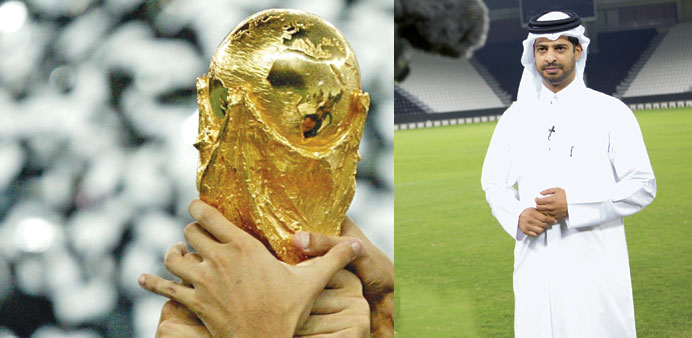Nasser al-Khater, Executive Director of Communications and Marketing at the Supreme Committee for Delivery and Legacy (right) and the World Cup (left).
Excerpts from the interview:
Q: The German development Minister Gerd Mueller has recently criticized the World Cup in Qatar, and said that there are ‘slave-like’ conditions. What do you say to this?
A: Of course the development Minister can talk about Qatar. Everyone is entitled to their opinion. But we have the impression, that many people talk badly about Qatar, without ever having been in the country. Many critics, who then come to Qatar, were very surprised about our commitment. Many then said that the government and also ourselves have undertaken many positive steps.
Q: Is the World Cup having an effect then on the society in Qatar?
A: The World Cup is a tool, to move a lot in Qatar, which includes also social progress. I therefore contradict all those who say that the World Cup should be taken away from Qatar.
Q: Which consequences does this have?
A: The World Cup has helped, to put more pressure on topics such as the working conditions. If there is a public discussion about these things, it motivates us to make progress more quickly.
Q: But since the start of the year, there have been shocking stories. Hundreds of workers from India and Nepal are said to have died working on the infrastructure for the World Cup. What do you say to that?
A: First of all I want to reiterate that we have had zero accidents on World Cup sites. At the moment we have had 93,717 man hours without incidents. Unfortunately many people link all projects in Qatar to the World Cup, which is not correct.
Q: So the numbers give a wrong picture?
A: Exactly. The statistic have to be checked. I want to note also that the government is trying to do a lot, to improve the conditions of the workers. I am convinced, that you will very soon hear of positive steps from the government. We make sure that all our contracts are according to our Standards. Contracts, which are often above international standards.
Q: At the start of the year, there was an increase in controls, 500 companies were sanctioned. Do the controls still need to be increased?
A: There have already been improvements, but of course it can still be done better. The Ministry of Labour is working to increase inspectors’ numbers. Until the end of the year 300 will be employed. And they are working with international organisations to train them in the right way.
Q: Qatar must open itself to the West. But could the tournament also help the West to understand Qatar more?
A: Of course, this is something that is close to our heart. A World Cup in the Middle East is the best way, for people and cultures to really come together. The World can get to know the rich culture of the Middle East, and the people here can greet fans from all over the world. That will be very positive. 2006 the World Cup had the same positive effect on Germany.
Q: You yourself lived in Bonn for some time. Do you hope for a special understanding from the Germans for Qatar’s undertaking?
A: I was in Bonn, when Germany became World Champions in 1990. I saw, how Germany lived the tournament and enjoyed it. I want to point out, that sport has always been part of our culture.
In 1973 Pele was here with Santos to play against Al Ahli, in 1988 we had the Asian Cup here, later there followed many top events like the 1995 U20 World Cup which we organised with three weeks’ notice. In 2015 the Handball World Cup will be here. All these have helped us to get into touch with the world. Also as a result of this history we have got the chance to host the World Cup in 2022.
Q: There is no official decision yet about the timing: whether it will stay a summer World Cup. Does this impact your work?
A: No, we will be ready, whether in summer or winter. We are ready for any date which the international community decides.
Q: Not only the development Minister Mueller fears for the environmental legacy of the World Cup in the desert. How can you address these fears?
A: Since the bid sustainability has been an important topic, all stadiums and buildings will be built to top standards, and cooling will be environmentally friendly.
Q: How do you see Qatar’s chances at the World Cup?
A: I hope that Qatar plays a good role. Now our aim must be to qualify for the World Cup in Russia.
Q: Will Qatar try to get football players from different countries?
A: No, our football federation is trying to get young Qataris to develop their skills. We are looking forward to a home grown team.
Just recently there was new rule to reduce the number of foreign players in the local league.

